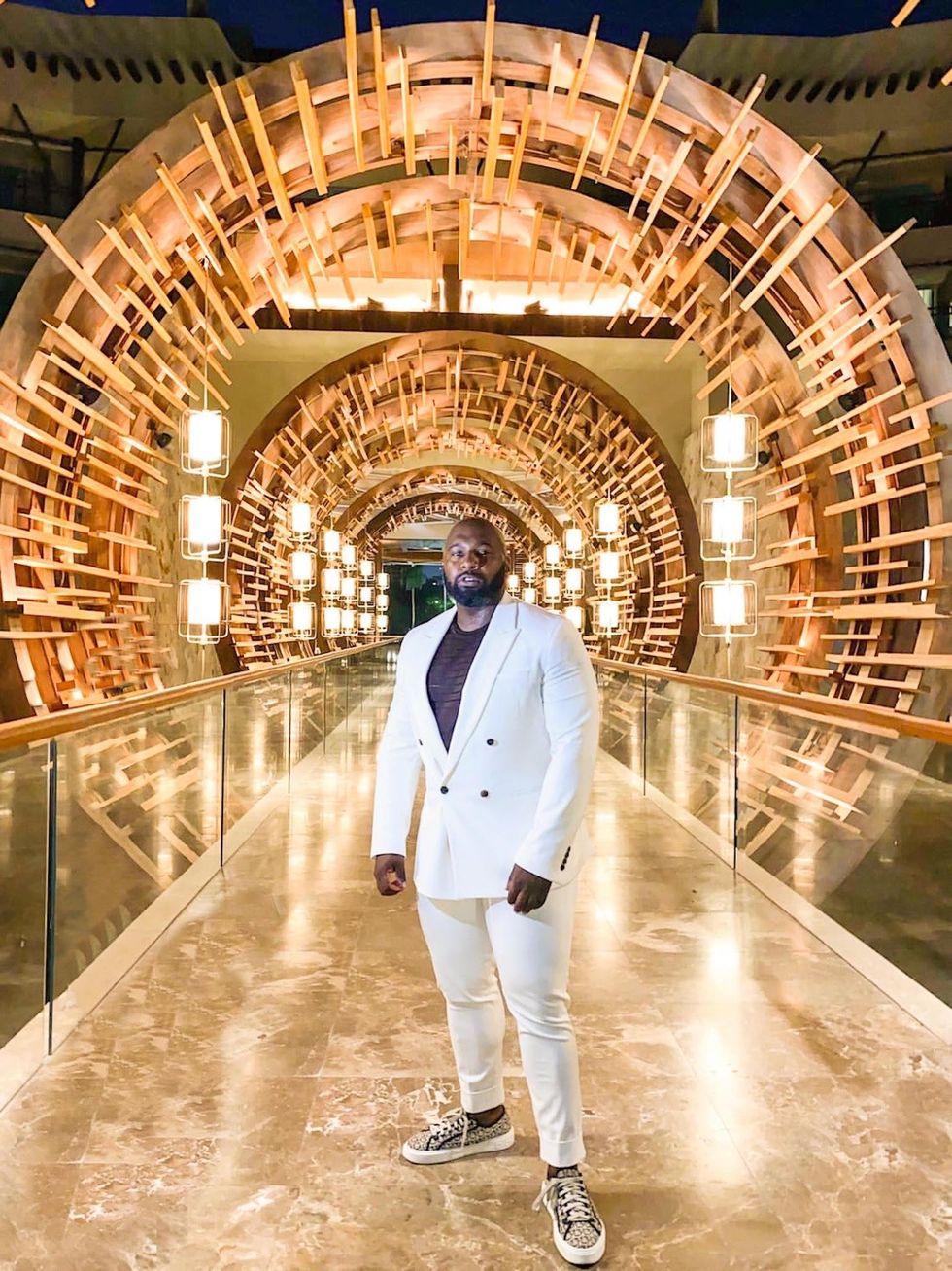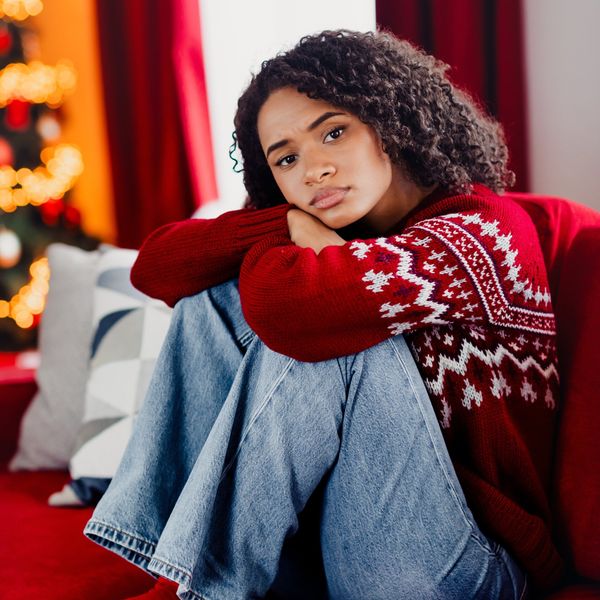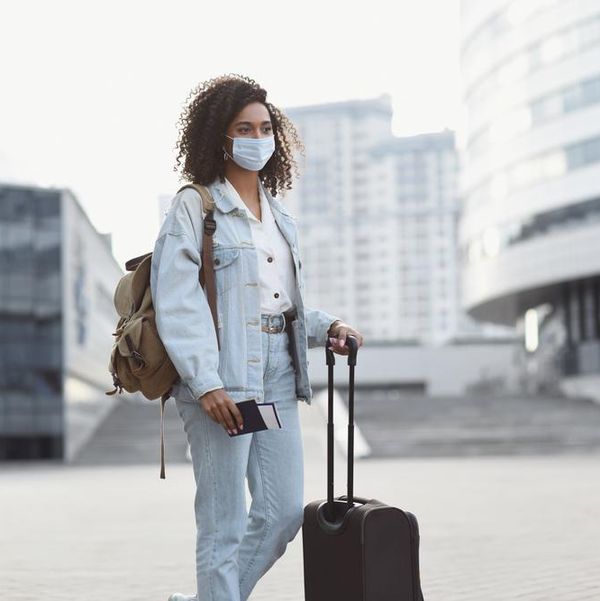
Since COVID-19 became a global pandemic in March, the travel industry has taken a major hit. And it's understandable that many people still aren't traveling, even with borders open and stay-at-home restrictions lifted. But, for those of us who live abroad, enjoy taking trips, or have loved ones in other countries, travel during pandemic times is a hard but necessary decision to make.
I'm one of the brave—and to some, crazy—souls who decided to travel shortly after borders reopened. I had my reasons, and so do others who have made the choice to go abroad even with the pandemic still looming. Here are our stories:
(Quick disclaimer: This is in no way meant to encourage travel at this time. It's simply a resource to inform and engage those who might be considering it.)
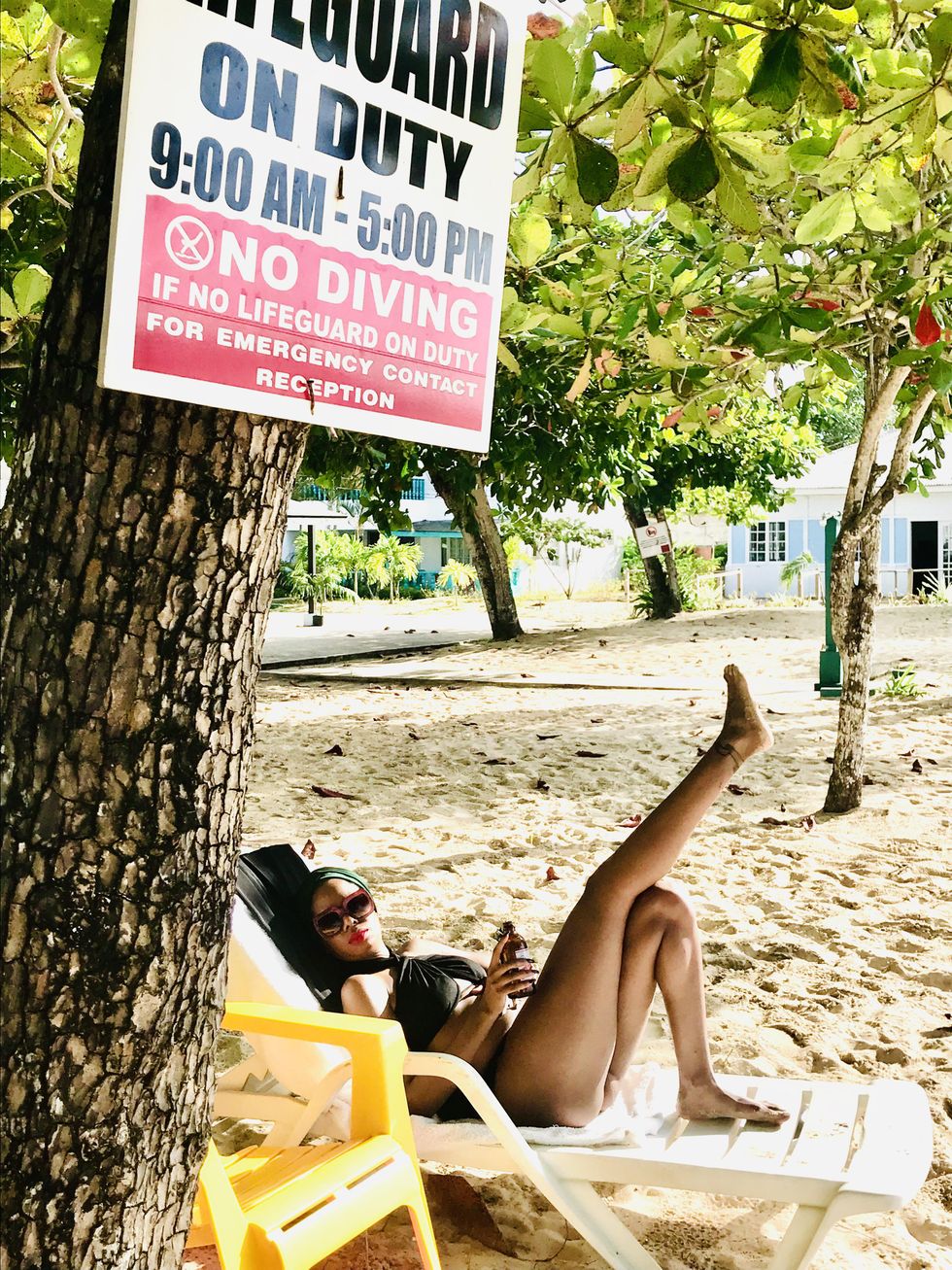
Image courtesy of Janell Hazelwood
Why I Chose to Travel During a Pandemic:
Janell: I've been in a long-distance relationship for three years, and not being able to see my fiance for months on end became devastating. Jamaica was like a second home, and frequent travel there had been my saving grace. I'd self-isolated for the whole month of March, and I'd been working from home even before the pandemic. I really didn't leave the house—even in the months thereafter—except the occasional walk around my yard or visit to the patio. When I needed food, toiletries, or groceries, I'd just have them delivered and left at my doorstep.
The pandemic brought a lot of hardship to my life, including loss of income, client reductions, and bouts of severe depression. I had flight credits, tickets that could be adjusted, and I was in good health. (I hadn't even had a common cold.) By September, the Jamaican government had reopened borders, so I decided to just go.
Jonathan: I've been in the hotel industry for the past 13 years. In March, I was furloughed as a result of COVID-19 and [was later] terminated. I had planned a trip to Peru in March and the week I was scheduled to depart, they closed their borders. Furthermore, I had planned a five-country tour to India, Thailand, Vietnam, Laos, and Hong Kong in April. Needless to say, that was canceled. So COVID changed my life personally and professionally.
I needed a mental break—with being furloughed, moving to a new city, being forced to stay in the house, and the racial tension. That was a lot of trauma to experience first-hand. I needed a quiet place to lick my wounds, recharge, and reevaluate some things.
Francesca: When the pandemic hit, I had plans to return to the Caribbean in time for carnival season. I am a full-time travel and lifestyle influencer, and I cover Caribbean travel pretty extensively. It was shocking to see borders close almost overnight. Some were giving as little as 48-hour warnings before halting flights.
"It was like my whole world changed overnight. It became especially painful as countries started announcing various travel bans."
I wanted to get back to see my partner in Martinique. We had been separated for so long, and I knew once borders started to open that I had to act quickly because just as soon as they had opened, they could very well close again.
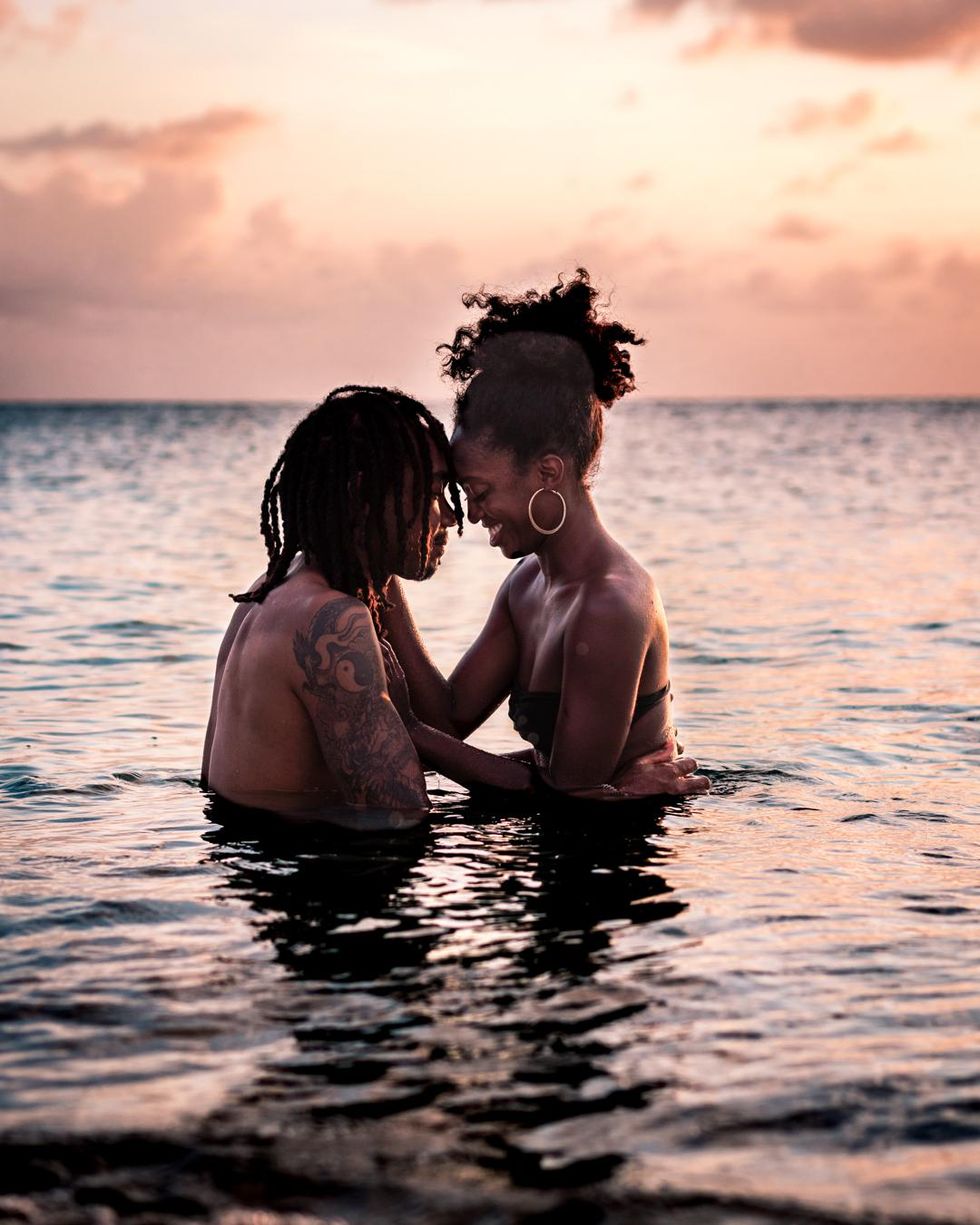
Photo by Willy Joseph-Louis
How to Prepare to Travel in a Pandemic:
Janell: Initially there was a bit of confusion on my part about the process. Early on, I'd heard rumors that you needed to download an app and get a COVID test before your trip, but I thought that was only for certain states. I was wrong. There indeed was—and still is—a pre-approval process for all travelers coming from the U.S.
Long story short, instead of confusing myself further by relying on YouTube videos and travel discussion threads, I went to the official authorities via VisitJamaica.com. This was the most detailed, accurate, and up-to-date resource. I had to get a COVID test, submit an application online with the negative test results attached, and then wait. The website indicated that it would take at least 48 hours for review, which was nerve-wrecking. It actually took four days, and I had to push my flight date back (yet again). I didn't mind because I'd be there for a little over a week, so losing a day or two wasn't a big deal.
The travel authorization was sent via email, so I screenshot it on my phone. I also printed out a copy of my negative PCR test, which was the test required at the time to move forward in the authorization process. I downloaded the JamCovid19 app just in case I'd be required to use it. (For more information on travel guidelines and restrictions, you can also visit the U.S. State Department site or the CDC website.)
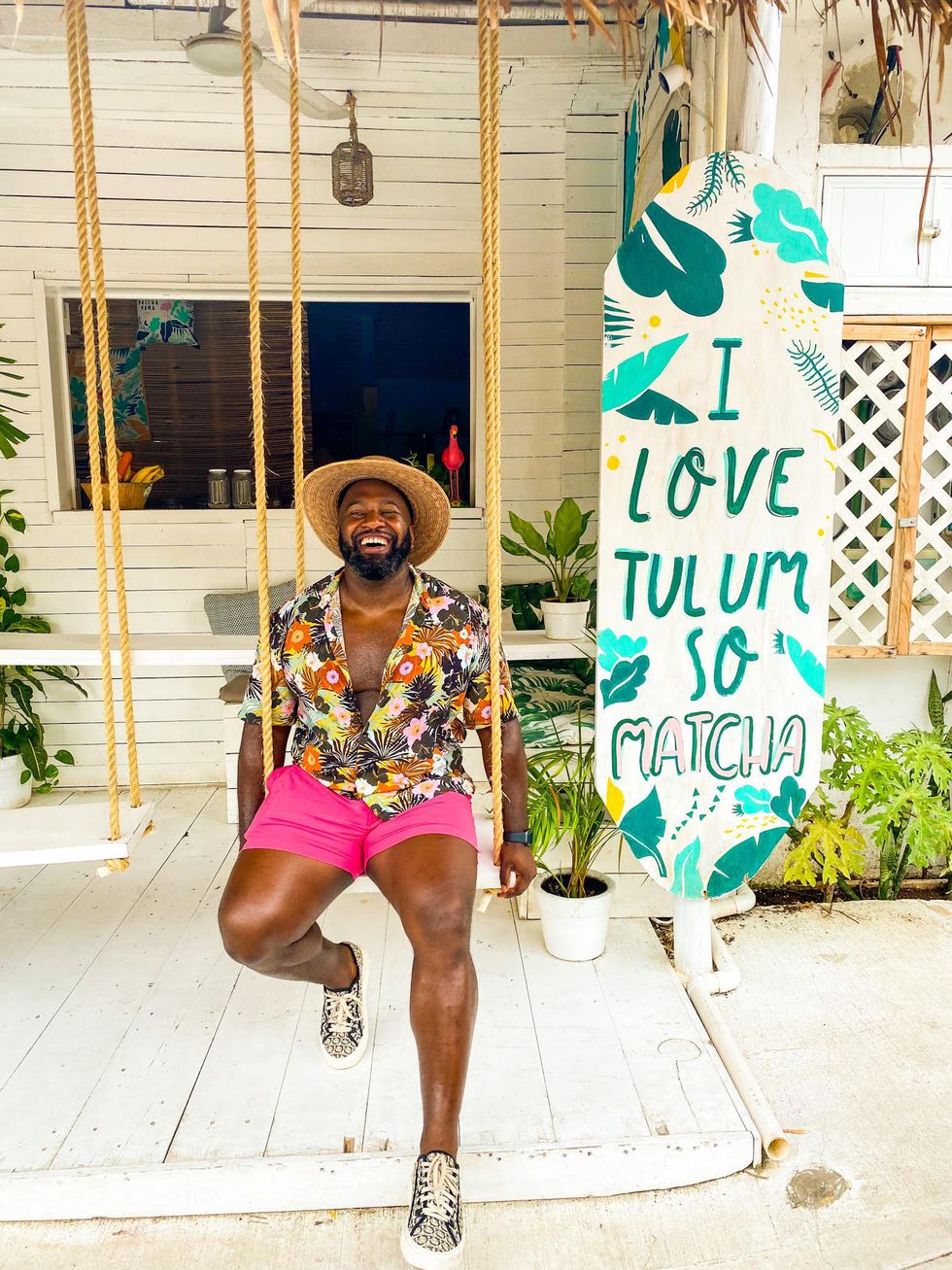
Image courtesy of Jonathan Curry
Jonathan: I went to Tulum, Mexico. [At the time], they didn't have any restrictions on travel nor did they require a COVID test to enter. The process was very seamless. I made sure I read all of the current government standards of the country. I packed several masks and Clorox wipes to wipe down my seats and table.
(For more information on current travel restrictions or requirementsin Mexico, please visit the U.S. Embassy and Consulates website here or the U.S. Department of State website.)
Francesca: I did a lot of research before booking my flight. I was more concerned with safety protocols than I was with flexibility. Ultimately it came down to two different airlines, and I ended up choosing the one that had a blocked middle seat over my usual airline where I accrue miles.
I brought a mask, of course, plenty of hand sanitizer, and my own food. Receiving a negative COVID test 48 hours before flying also gave me great peace of mind. I could assume that since it was an entry requirement, everyone I was traveling with most likely was negative as well.
(For more information on travel requirements and restrictions in Martinique, visit the CDC website or the U.S. Department of State website.)
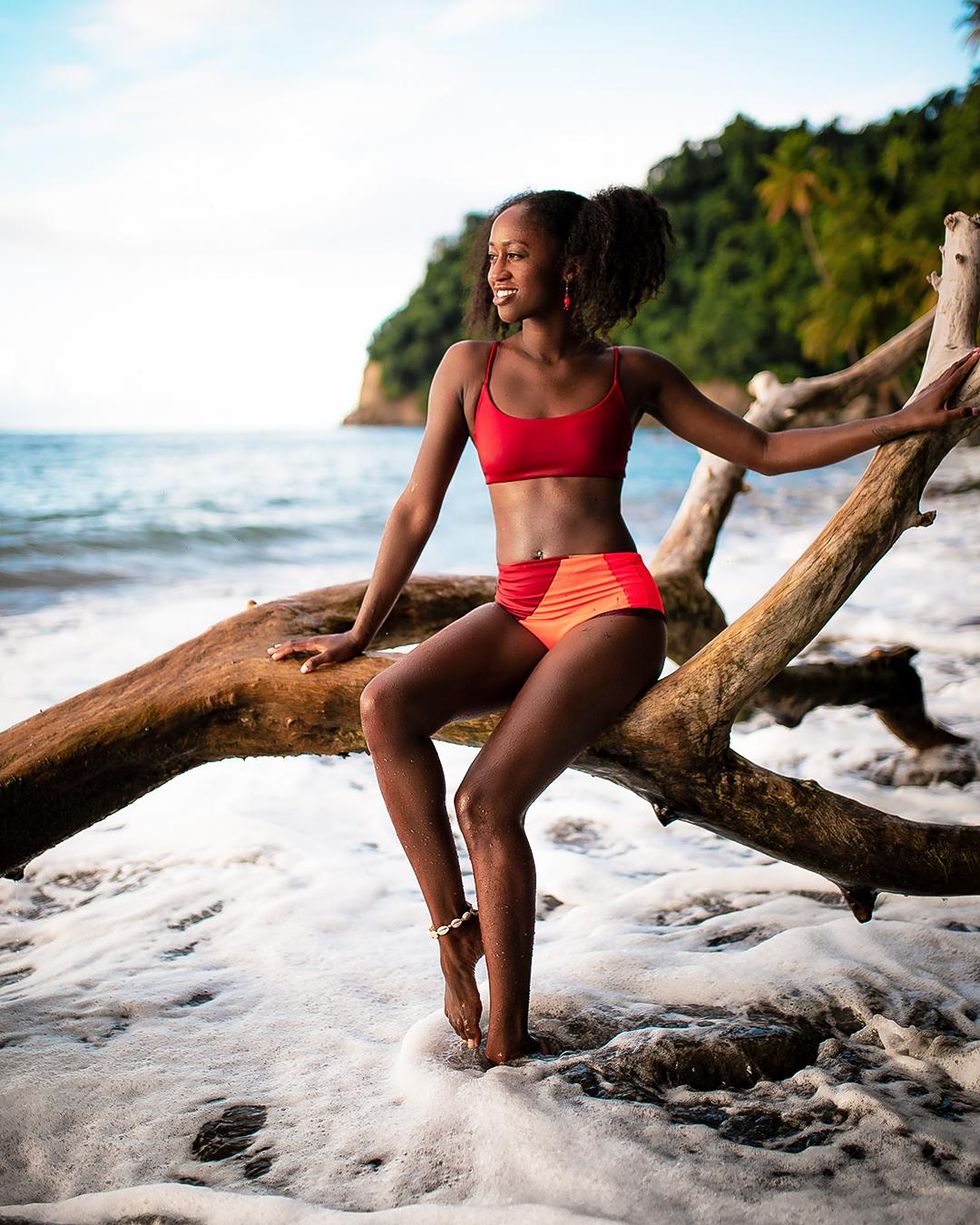
Photo by Willy Joseph-Louis
What to Expect at the Airport & Upon Arrival:
Janell: I could not check in for my flight online, as I typically do. It was not allowed for international trips. I had to wait for the desk to open at the airport and check in with an associate. Other than that, the airport process and experience in the States was the same as it had always been except there were less people, you had to present your authorization document, and there were masks and social distancing requirements.
Upon arrival in Jamaica, I was delightfully surprised. The lines were typical but there was social distancing and an extra process added to the usual ones that involve customs and baggage claim. I'm always prepared to spend at least an hour at the Montego Bay airport during normal circumstances, and the extra process of checking my travel authorization document, getting information about my health and lodging plans, and listening to instructions on how I would quarantine only took an extra 30 minutes or so.
The officials and airline workers were kind, straight-forward, and efficient. My temperature was taken, and I was given a form with information on quarantining. I was also instructed about the "resilient corridor" limits I was to remain within during my stay and told what to do if I suddenly had any symptoms of COVID. (I wasn't told to download or use the app. I'm not certain as to why, but I kept it on my phone anyway. I suspect it was due to my length of stay and my choice to book at a compliant hotel.)
The experience was the total opposite of the nightmares of three-hour waits, scary soldiers, and double testing that I'd heard about.
Jonathan: Outside of the mask mandate, the airline didn't have any other restrictions in place. Fortunate for me, the middle seat was empty next to me and another young lady occupied the window seat. The flight was about 65-percent full. The airport was quiet, all the lines were very short, and there were limited food options in the concourse. You could cancel and get a flight credit with the airline.
Once I arrived, I had to keep my mask on throughout the airport. They had markers [6 feet apart] on the floor to make sure you weren't too close to your neighbor. Once through customs, I went through a non-intrusive temperature scan.
Francesca: I was impressed by how strictly the airline was enforcing their mask policy. I heard that they had added nearly 100 people to their no-fly list for non-compliance. They meant business!
I found that once it came time to fly, the airport was surprisingly empty. I think I interacted with less people throughout the flying experience than I do going grocery shopping.
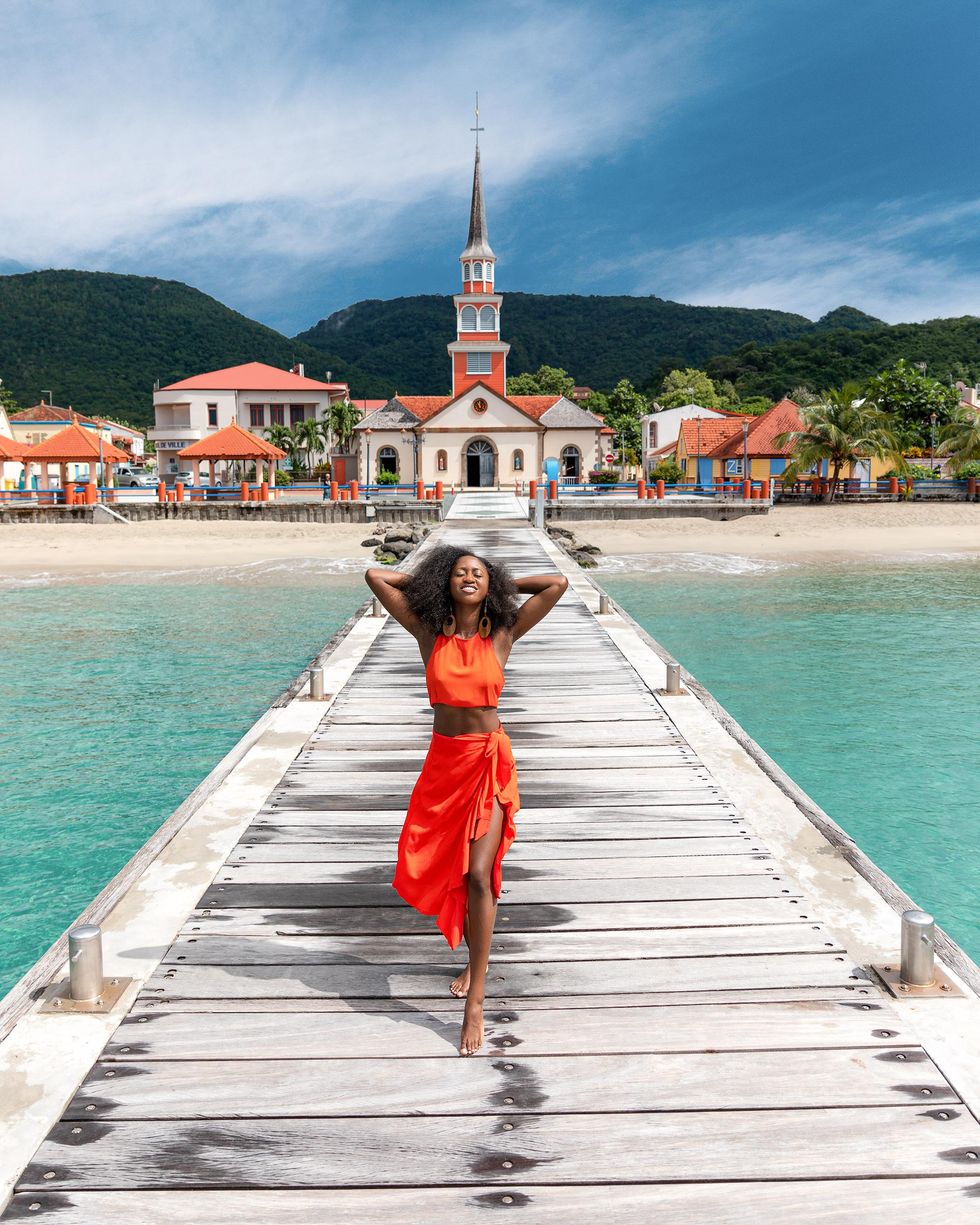
Photo by Willy Joseph-Louis
The Trip Experience:
Janell: Typically, I'm able to go wherever I want, and I'm all over the place. I might be in Kingston one weekend, Negril, Savanna-la-Mar, Hanover, or Lucea the next, then off to Montego Bay. That totally changed. It was literally like a ghost town compared to the usual, and a curfew was being enforced. Though I did not have to download the app and check in via video, I didn't feel comfortable going anywhere other than the nearby beach, adjacent shops, the hotel pool, and back to my room. My fiance would bring food or we'd order in. The cleaning staff disinfected my room daily, the few people on site practiced social distancing, and everyone wore masks. (Negril Beach Club is actually a favorite of ours and the vicinity to Seven Mile Beach is divine.) I also noticed that most places required temperature checks and hand sanitizer use before allowing tourists to enter.
At my hotel, the vibes were super-mellow—even for Jamaica—and there were hardly any other tourists to talk to or at least be around—even at a distance. It got a tad boring and monotonous after three days because I'm used to being able to go on excursions or local adventures, however, I remembered why I was there—to spend time with my fiance. That was good enough for me. Due to quarantining, I was also able to watch the landmark general elections on TV with him and witness the honking cars and small celebrations from our balcony—a historical moment for us to share.
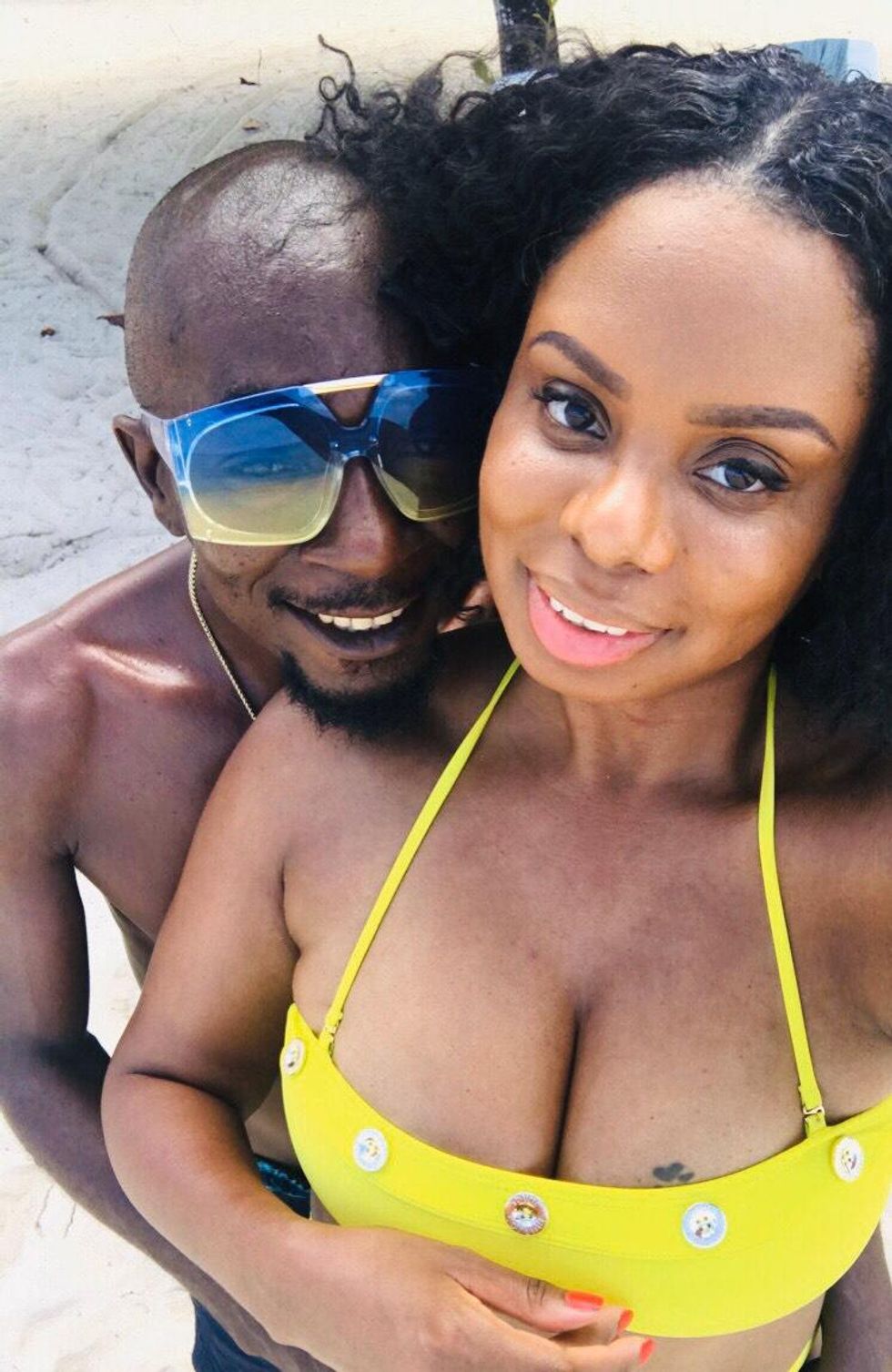
Image courtesy of Janell Hazelwood
Jonathan: Tulum still had some action when I first arrived, however beaches closed at 5pm and there was an 11pm curfew.
Francesca: My experience landing was a bit strange because I'm used to landing at an airport and being immediately surrounded by people. There were no large groups eagerly awaiting loved ones, and the airport was nearly empty. I was pleased to see the people who were present were wearing masks and respecting social distancing guidelines.
Travel Tips for Traveling in a Pandemic:
Do your research. Don't just rely on hearsay or online videos. While they might be helpful, look to the official authorities about what's required for travel and the recommendations based on where you want to go. Also, pay close attention to the cancellation, business hours, or booking policies of hotels, airlines, major attractions, and travel agencies.
If you're required to pre-test for authorization, be sure to get the correct test at the correct time. As of recent, test results can't be more than 10 days old and there are specific types of tests required. Ask your healthcare provider or test administrator lots of questions and make sure you're getting the correct type at a certified center or lab. Print out your results and authorization as well.
Go with an open mind and release the selfish vibes. COVID-19 is still very real, and the fears of locals are warranted, so if you're not able to freely do the things you're used to doing on vacation, make the best of it. Be grateful for the front-line workers serving you at the hotels, beaches, airports, and restaurants, and show that gratitude by tipping well and following protocols.
When in doubt, just stay home. If it's not an emergency or there's so much involved with planning that it causes you and your family unnecessary stress, wasted time, and extra money, reconsider traveling at all. Many airlines, hotels, and travel agencies are offering options for cancelling or rescheduling trips, and to be honest, this might be the time to do a domestic solo trip in your town or to focus on other goals.
Jonathan:
Have a plan B. With restrictions returning, have another plan just in case things get canceled.
Assess your tribe. [This is] your community that you come in contact with on a daily basis. Is anyone in your tribe high-risk as it relates to COVID? Are you able to quarantine in isolation if you contract it? We all have to do what we feel is best for us while still considering the community we will return to. Get yourself tested before and after travel, for your own safety and the safety of others.
Francesca: The No. 1 thing is to comply with local health regulations and consult official websites frequently. The situation is constantly evolving, and staying on top of it is critical. And please, wear a mask and wash your hands frequently!
For more of Janell, Jonathan, and Francesca, follow them on Instagram @janellirl, @thejonrobert, and @onegrloneworld.
Featured image by Shutterstock
Your December 2025 Monthly Horoscopes Are All About Surrender & Alignment
December is about letting go. We end the year with the need for more peace, reflection, and rejuvenation, and that is exactly what December is providing for us. The Sun is in Sagittarius, and anything is possible. This is the month to believe in that and to know that the universe is supporting you. With a Supermoon in Gemini as we begin the month as well, we have an opportunity to gain the closure we have been looking for this year and to wrap up old projects, ideas, and communication breakthroughs.
This is the month to make your peace the priority and let go of trying to control the way the tides are turning. Trust in your new beginning, and give yourself time to prepare for it this month.
A big part of the clarity that is coming through this month is due to Neptune going direct in Pisces on December 10, after being retrograde here since July. With Neptune now direct, we are able to see our inspiration and creativity a little more clearly, providing the perfect energy for dreams and manifestation to be built upon. The smoke is clearing, and it’s up to you to decide what you want to do with this newfound clarity that this transit is bringing. Mercury also moves back into Sagittarius on December 11, which is great for communication and clarity, and the adventures you were trying to see through at the beginning of November come around for you again with greater purpose and support.
On December 15, Mars enters Capricorn until the end of January 2026, and this is the extra push we need to make important changes and to be on the path towards greater abundance, stability, and prosperity. Mars in Capricorn takes care of business, and we have extra energy at our disposal during this time to do so. This transit is an ideal time to focus on your career or financial goals for next year and to start putting some of these plans into motion now. A few days later, we have the New Moon of the month, which will be in Sagittarius on December 19, and this is the perfect New Moon to manifest.
The energy is high, magic is in the air, and it’s all about moving forward with the new beginnings that are inspiring you and bringing you joy to think about right now.
Capricorn Season officially begins on December 21, and this earth sign energy is how we heal, gain closure, and build new foundations in our world. With Venus also moving into a Capricorn a few days later, there is something about peace, prosperity, and security that we are gaining in life and in love as we close out the year, and this is what we need right now. This month is about reflecting on what was, letting go of old hurt, and renewing. December is an ending and a new beginning in one, and there is magic in this space to be created.
Read for your sun and rising sign below to see what December 2025 has in store for you.
 AriesKyra Jay for xoNecole
AriesKyra Jay for xoNecoleARIES
December is a full-circle moment for you, Aries. You are seeing the gifts in your world and have a lot of gratitude for the way things have come about for you as of late. There are culminations in your world that are providing you with more abundance, stability, and community, and you are exactly where you are meant to be this month. With the Sun in a fellow fire sign and in your 9th house of travel for most of the month, December is a good time to get out of your comfort zone, explore the world around you, and get your body moving.
Mars, your ruling planet, also makes a change and moves into Capricorn on December 15, which will fuel your inspiration and power in your career space. You are making a lot of professional progress as we close out the year; however, make sure to be more mindful of your competitive drive right now. The New Moon on December 19 is the perfect opportunity for you to create some new plans and goals when it comes to traveling, education, and where you want to gain some new inspiration in your world. Overall, this is a month of things coming together for you serendipitously.
 TaurusKyra Jay for xoNecole
TaurusKyra Jay for xoNecoleTAURUS
December is about trusting your intuition, Taurus. You have a lot on your mind this month, and it’s best to delegate, communicate, and allow yourself some relief by opening up to someone and not feeling like you have to hold everything in. As we begin the month, we have a Supermoon in Gemini happening in your house of income, and the plans and projects you have been building here come to fruition for you now. This is the time to gain clarity on your financial world and to take a look at what spending habits you want to let go of here as well.
With Venus in your 8th house of shared resources for most of the month, you are doing a cleanse on your commitments, partnerships, and business ventures. You are taking a look at what you want to dedicate yourself to in the future, and what commitments you may need to let go of now in order to be in the space you truly want to be, both financially and within some of your relationship dynamics. Before we end the month, we have a New Moon in this same area of your chart, and it’s time to look at the opportunities that are presenting themselves and to trust your internal guidance system to lead you forward.
 GeminiKyra Jay for xoNecole
GeminiKyra Jay for xoNecoleGEMINI
You are moving forward fearlessly this month, Gemini. December is your month of love, passion, and dignity, and you are owning the light that you shine. We begin the month with the last Supermoon of the year, happening in your sign, and you are stepping up to the plate. You are showing up, owning how much you have grown this year, and allowing yourself to heal while also acknowledging that you have done your best and you deserve to have fun in the midst of the changes you are creating.
Mercury, your ruling planet, is officially out of retrograde, and you can use this energy to the fullest potential now. With Mercury in your 7th house of love, it’s time to speak from the heart and to talk about the things that matter and that are inspiring you right now to your loved ones. You never know what kind of epiphanies you may have when you open up the conversation to others. Before the month ends, you have a New Moon in this same love area of your chart, and this New Moon is all about manifesting romance, commitment, and abundance in your world.
 CancerKyra Jay for xoNecole
CancerKyra Jay for xoNecoleCANCER
December is an opening for more love, more joy, and more freedom in your life, Cancer. You have come to a place where you hold so much gratitude in your heart for where you are today and where your heart is shining, and things come together for you with more ease right now. With the Sun in your 6th house of health, work, and daily routines for most of the month, you are getting your ducks in a row while also putting more energy and effort into taking care of yourself, your priorities, and your well-being. This month surprises you in many ways, and it’s because you are showing up.
Mars and Venus both move into your house of love, relationships, marriage, and abundance this month, and you are making strides in your love life. You have both of these opposing forces on your side and are being recognized for the love you are while also receiving the love you want. This month, overall, is about focusing more on the positives in your world and letting your heart have its joy. Before December comes to an end, there is a New Moon in Sagittarius, and this is the perfect opportunity to create the plans you want to see through next year, especially when it comes to your work life, colleagues, business ventures, and health.
 LeoKyra Jay for xoNecole
LeoKyra Jay for xoNecoleLEO
The scales of karma are balancing, and they are balancing in your favor this month, Leo. December is your month of truth, and of seeing it clearly in your world. The Sun is in your house of romance, pleasure, and happiness for most of the month, and it’s time to relax, be in the present moment, and allow what is meant to be, to be. With a Supermoon in your 11th house of manifestation as December begins, this is a powerful month for seeing your dreams come to fruition, and for feeling like the intentions you have set this year are finally here for you now.
Mars also moves into your 6th house mid-month, and this is the perfect energy to have to move into the new year. You have extra energy at your disposal right now and are feeling fearless with what is possible for you and your daily routine. Before the month ends, we also have a New Moon in a fellow fire sign, Sagittarius, and this is a breakthrough moment for you and your heart. December, overall, wants to show you how loved and supported you are and will be doing so in magical, unexpected, and concrete ways.
 VirgoKyra Jay for xoNecole
VirgoKyra Jay for xoNecoleVIRGO
December is a month of victory, Virgo. You are showing up and experiencing some new successes in your world that move you forward on your path in life. With a Supermoon in your 10th house of career as we begin the month, the effort and intentions you have made this year come into full bloom, and you are being recognized for who you are and the good work you have done. This month is all about showing up and allowing yourself to be seen and loved, knowing that you deserve the support and opportunities you are receiving.
Mars moves into Capricorn on December 15, which brings the passion and excitement into your love life, hobbies, and little pleasures in life that light you up. You want to have fun this month and are going to be walking into the new year with this fearless, happy, and spontaneous energy within you. Before the month ends, Venus also enters Capricorn, and in this same area of your chart, you have a lot to look forward to and believe in right now. Overall, December wants you to be happy and will be doing everything possible to make that happen for you. This is your month to shine, Virgo.
 LibraKyra Jay for xoNecole
LibraKyra Jay for xoNecoleLIBRA
December is a month of opportunity for you, Libra. New doors open, and you are financially making breakthroughs this month because of it. December begins with a Supermoon in your 9th house, and you are getting a clearer view of where you have been making strides in your life and how it has all brought you here to this present moment of freedom. This month is showing you what happens when you are fearless with your purpose and when you believe in yourself and what you are worthy of.
Moving further into December, Mars moves into your 4th house of home and family mid-month, and you are closing out the year in your safe spaces. You are spending more time with your loved ones and taking the time to quiet your mind and listen to what your heart has been telling you. Before the month ends, we have a New Moon in Sagittarius, happening in an area of your life that deals with communication. This is a great time for getting the answers you have been looking for and for feeling more clear-headed and confident about the decisions you are making as you move into the new year.
 ScorpioKyra Jay for xoNecole
ScorpioKyra Jay for xoNecoleSCORPIO
Patience is a virtue this month, Scorpio. December is all about remaining patient and vigilant with what you are creating in your world, and knowing that the universe has your back. It’s time to be reminded of the power of hope, and this month is an opening to greater clarity in your life. There is a lot of energy in your financial zones right now, and this is providing you with new opportunities and new insight; however, the speed at which things come about for you may feel daunting. Keep your head up and eyes focused on what you want and know that you are more than worthy of receiving it.
With Mercury in your 2nd house of income this month, December is a good time to plant new seeds and to think about where you want to be financially a month from now or even a year. This month is asking you to think bigger and to think more long-term so that you can set the appropriate plans into motion now. We also have a New Moon in your house of income before the month ends, and this is when you will see more of your dreams come to fruition in this area of your life, and have more opportunities to build. Overall, December will be teaching you a lot, Scorpio.
 SagittariusKyra Jay for xoNecole
SagittariusKyra Jay for xoNecoleSAGITTARIUS
Sagittarius Season is here, and there is a lot in store for you this month, Sag. December is all about what you are dedicating yourself to. It’s about setting your intentions and putting the work in to back up your dreams, and about getting things in order so that when the new beginnings come, you are ready for them. The Sun and Venus are in your sign for most of this month, and there are a lot of eyes on you right now. You have the potential to create a new beginning for yourself, and it’s time to invest in yourself, your love life, and your dreams.
Mercury moves into Sagittarius on December 11, and this is giving you another opportunity to see through some of the plans that you had initiated in November. Mercury was retrograde in your sign last month, and there may have been some disruptions to your vision and plans for the future, and now this energy is turning around for you. Before the month ends, we also have a New Moon in Sagittarius, and you are walking through new doors fearlessly. You are catching others by surprise by your growth this month, and you are thinking a lot about your purpose, future, and plans for the new year.
 CapricornKyra Jay for xoNecole
CapricornKyra Jay for xoNecoleCAPRICORN
December is all about the vision, Capricorn. You are moving through a lot of changes and transformations this month, yet they are giving you a chance at a new beginning in the process. You are focused more on the future and what goals you want to manifest for yourself right now, and are ready to let go of what hasn’t been working for you. With the Sun in your 12th house of closure for most of December, this is your time for healing, but remember, healing doesn’t have to be isolating or boring; you can thrive while you renew, and you are this month.
Mid-month, the excitement picks up for you, and you are feeling more energized than you have in a while. Mars moves into Capricorn until the end of January 2026, and you are being proactive with your goals, intentions, and passions. You are a force to be reckoned with this month, and you are making things happen for yourself with confidence. Capricorn Season officially begins on December 21 this year, and this is definitely speeding up your healing process. You are breaking free from what was, and with Venus also moving into Capricorn before the month ends, you are leaving this year in high spirits and with love opening a new door for you.
 AquariusKyra Jay for xoNecole
AquariusKyra Jay for xoNecoleAQUARIUS
December is all about community, creativity, and manifestation, Aquarius. This is the month to work together with others to help bring your dreams to life. You are in a space of inspiration, empowerment, and beauty, and are creating more of this energy around you and in your world. Look out for what support comes your way this month and know that you don’t have to do everything alone to succeed. With the Sun in your 11th house of manifestation and friendship, your intentions are coming to fruition, and it’s time to celebrate with the people you love and to own how far you have come this year.
On December 19, we have a New Moon in Sagittarius, lighting up your life in all of the best ways possible. This is your New Moon of freedom, victory, and magic, and you are seeing new beginnings appear that you were once just hoping for. Before the month comes to an end, Venus moves into your 12th house of closure, and after an active and successful month, you are ready to relax, heal, and give your heart some of the attention it has been asking for. You are moving into the new year with the need to release and renew what hasn’t been working in your relationships, and you are finally ready to.
 PiscesKyra Jay for xoNecole
PiscesKyra Jay for xoNecolePISCES
December is a big month for you, Pisces. You are making some huge accomplishments this month, and are feeling like everything you have been through this year has been worth it for these moments that are coming to fruition for you now. The Sun is in your 10th house of career and reputation for most of the month, and this is where a lot of your focus is right now. You are claiming your successes and putting yourself out there in ways that not only serve you, but that inspire others as well.
Neptune officially goes direct on December 10, after being retrograde in your sign since July, and you are finally seeing things a little more clearly. You are feeling renewed inspiration and passion in your life, and your intuition is your strongest asset right now. Before December comes to an end, we also have a New Moon in your 10th house of career, and what happens now not only changes things for you in the present, but it also opens new doors and what is possible for you in the new year as well. Overall, you are on top of your game this month and are owning the joy and empowerment you feel.
Featured image by Kyra Jay for xoNecole
Don Benjamin On New Projects, Family & How He And His Wife Healed After Public Split
Actor and model Don Benjamin continues to expand in his career while also being a present husband and father. We first learned of the model in 2013, competing on America's Next Top Model Cycle 20, and now he's starring in major films like the recent Jordan Peele movie HIM and Adopted 2.
He was even the leading man in Cardi B's latest music video "Safe," which also features Kehlani. In an exclusive xoNecole interview, Don opens up about his family and this phase in his life.
"Honestly, the funny thing is, it's just like any other phase," he admits. "I just focus on work and growth and leveling up. I'm super excited about this moment because now, I'm finally tapping more into my acting side of stuff." He also shows off his acting skills on social media. Don, along with his wife, Liane V, often shares cute family skits on their respective Instagram and TikTok pages.
The couple share two kids, 2-year-old daughter Zaia Sky and Zaiden, who they had in June 2025. According to Don, Zaia is already following in his footsteps. "She's already doing more modeling jobs than me as of lately, and we want to get her in some acting. She loves the camera," he says. "It'll be nice to see if she follows in my footsteps, and I can kind of help line some things up for her."
Don and Liane have been married for four years, but had a very public breakup the year before. The Scared Famous star reveals how they did the work to heal and move forward together.
"We had our time to separate and work on self-growth, things that I needed to do for myself as a man, and working with life coaches and therapists, and she got the time to do what she needed to do. So when we came back together, we were in the right space mentally. We got a relationship coach that we can go through things with and talk about and work on and these things were important for us. Now, over the years, I feel like that actually helped us come closer together. That moment helped us come closer together."
"We had our time to separate and work on self growth, things that I needed to do for myself as a man, and working with life coaches and therapists, and she got the time to do what she needed to do. So when we came back together, we were in the right space mentally."
He continues, "I did what I had to do to understand [that] as a man, I never really had any male guidance in my life. So it was able to align me with the right coaches and pastors and therapists and people that I needed to align with to work on things that I had been dealing with in life. Then she got the space that she needed as a woman to work on her independence.
"We came back together strong, and now we were able to get married in the right space. A lot of times, people jump into marriage when they're not fully healed or in the right headspace. So we were able to get married in that right space. For us, it's been a beautiful thing, and we're able to use that as as an example."
Don also believes it's important to set an example for their kids, especially when it comes to love and respect. While the actor grew up without his dad, he has made it his priority to instill love in his kids by showing up for them and giving them words of affirmations.
As far as what's next for Don, he is starring and executive producing a paranormal activity film titled, holySmoke. "I'm loving the drama and horror space right now," he says.
"I always love a good romantic comedy, but right now. I seem to be getting reeled into all these horror films and thrillers and dramas."
Let’s make things inbox official! Sign up for the xoNecole newsletter for love, wellness, career, and exclusive content delivered straight to your inbox.
Feature image Nikita Melvil



